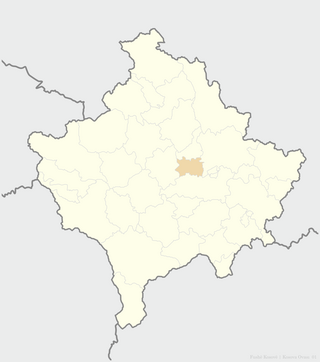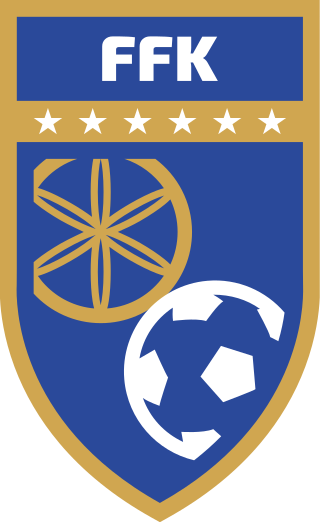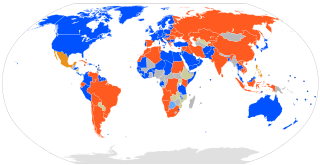
The Kosovo War was an armed conflict in Kosovo that lasted from 28 February 1998 until 11 June 1999. It was fought between the forces of the Federal Republic of Yugoslavia, which controlled Kosovo before the war, and the Kosovo Albanian rebel group known as the Kosovo Liberation Army (KLA). The conflict ended when the North Atlantic Treaty Organization (NATO) intervened by beginning air strikes in March 1999 which resulted in Yugoslav forces withdrawing from Kosovo.

Kosovo, officially the Republic of Kosovo, is a country in Southeast Europe with partial diplomatic recognition. Kosovo lies landlocked in the centre of the Balkans, bordered by Serbia to the north and east, North Macedonia to the southeast, Albania to the southwest, and Montenegro to the west. Most of central Kosovo is dominated by the vast plains and fields of Metohija and the Kosovo field. The Accursed Mountains and Šar Mountains rise in the southwest and southeast, respectively. Its capital and largest city is Pristina.

The United Nations Interim Administration Mission in Kosovo (UNMIK) is the officially mandated mission of the United Nations in Kosovo. The UNMIK describes its mandate as being to "help the United Nations Security Council achieve an overall objective, namely, to ensure conditions for a peaceful and normal life for all inhabitants of Kosovo and advance regional stability in the Western Balkans."

The Kosovo Liberation Army was an ethnic Albanian separatist militia that sought the separation of Kosovo, the vast majority of which is inhabited by Albanians, from the Federal Republic of Yugoslavia (FRY) and Serbia during the 1990s. Albanian nationalism was a central tenet of the KLA and many in its ranks supported the creation of a Greater Albania, which would encompass all Albanians in the Balkans, stressing Albanian culture, ethnicity and nation.

Kosovo Polje or Fushë Kosova, is a town and municipality located in the District of Pristina in central Kosovo. According to the 2011 census, the town of Kosovo Polje has 12,919 inhabitants, while the municipality has 33,977 inhabitants.

Mitrovica or Kosovska Mitrovica, officially South Mitrovica, is a city and municipality located in Kosovo. Settled on the banks of Ibar and Sitnica rivers, the city is the administrative center of the District of Mitrovica.

The Kosovo Force (KFOR) is a NATO-led international peacekeeping force in Kosovo. Its operations are gradually reducing until Kosovo's Security Force, established in 2009, becomes self-sufficient.
Music of Kosovo is music that originates from Kosovo, a country in the Balkans. Kosovo's population is mainly Kosovo Albanians, also known as Kosovars, and there are various minority ethnic groups as well. Kosovan music is closely related to that of neighbouring Albania, as well as to that of countries in the former Yugoslavia.

A municipality is the basic administrative division in Kosovo and constitutes the only level of power in local governance. There are 38 municipalities in Kosovo; 27 of which have an Albanian ethnic majority, 10 Serb and 1 Turkish. After the 2013 Brussels Agreement, signed by the governments of Kosovo and Serbia, an agreement was made to create a Community of Serb Municipalities, which would operate within Kosovo's legal framework. Since 2013, the agreement has not been fulfilled by Kosovo's authorities, calling upon its constitution and "territorial integrity". Serbia does not recognize Kosovo as a sovereign state, but as an autonomous province according to its constitution.

The Kosovo national football team represents Kosovo in men's international football. The team is controlled by the Football Federation of Kosovo, the governing body for football in Kosovo, and is under the jurisdiction of FIFA globally.
The political status of Kosovo, also known as the Kosovo question, is the subject of a long-running political and territorial dispute between the Serbian government and the Government of Kosovo, stemming from the breakup of Yugoslavia (1991–92) and the ensuing Kosovo War (1998–99). In 1999, the administration of the Autonomous Province of Kosovo and Metohija was handed on an interim basis to the United Nations under the terms of UNSCR 1244 which ended the Kosovo conflict of that year. That resolution reaffirmed the territorial integrity of Serbia over Kosovo but required the UN administration to promote the establishment of 'substantial autonomy and self-government' for Kosovo pending a 'final settlement' for negotiation between the parties.
The Football Superleague of Kosovo, also known as the ALBI MALL Superleague of Kosovo for sponsorship reasons with Albi Mall, is the top level of the Kosovar football league system. The Superleague is organized by the Football Federation of Kosovo and the division currently has a 10-team format. The clubs play each other four times during the season for a 36-match schedule. At the end of the season, the bottom two teams in the division are relegated to the second tier, First Football League of Kosovo.
The 2008 Kosovo declaration of independence, which proclaimed the Republic of Kosovo to be a state independent from Serbia, was adopted at a meeting held on 17 February 2008 by 109 out of the 120 members of the Assembly of Kosovo, including the Prime Minister of Kosovo, Hashim Thaçi, and by the President of Kosovo, Fatmir Sejdiu. It was the second declaration of independence by Kosovo's Albanian-majority political institutions; the first was proclaimed on 7 September 1990.

International recognition of Kosovo, since its declaration of independence from Serbia enacted on 17 February 2008, has been mixed, and international governments are divided on the issue. The Government of Serbia does not diplomatically recognise Kosovo as a sovereign state, although the two countries have enjoyed normalised economic relations since 2020 and have agreed not to try to interfere with the other's accession to the European Union.

Pristina is the capital and largest city of Kosovo. It is the administrative center of the eponymous municipality and district.

The Autonomous Province of Kosovo and Metohija, commonly known as Kosovo and abbreviated to Kosmet or KiM, is an autonomous province defined by the Constitution of Serbia that occupies the southernmost part of Serbia. The territory is the subject of an ongoing political and territorial dispute between Republic of Serbia and the partially recognised, self-proclaimed Republic of Kosovo, the latter of which has control over the territory. Its claimed administrative capital and largest city is Pristina.

The Kosovo Security Force is the military of Kosovo. KSF is tasked with defending the sovereignty and territorial integrity of Kosovo, military support for civil authorities, and participation in international peacekeeping missions and operations. Since 2018, it is in the process of transforming into the Kosovo Armed Forces, a process that is expected to take 10 years.

The Catholic Church has a population in Kosovo of approximately 65,000 in a region of roughly 2 million people. Another 60,000 Kosovan Catholics are outside the region, mainly for work. They are mainly ethnic Albanians, with a few Croats.
The First Agreement of Principles Governing the Normalisation of Relations, informally known as the Brussels Agreement, is an agreement to normalize relations between the governments of Serbia and Kosovo. The agreement, negotiated and concluded in Brussels under the auspices of the European Union, was signed on 19 April 2013. Negotiations were led by Serbian Prime Minister Ivica Dačić and Kosovo Prime Minister Hashim Thaçi, mediated by EU High Representative Catherine Ashton. The government of Serbia does not recognize Kosovo as a sovereign state, but began normalising relations with the government of Kosovo as a result of the agreement. In Belgrade, the agreement was criticized by protestors as a convalidation of Kosovo independence.

The Kosovo Agency of Statistics monitors various demographic features of the population of Kosovo, such as population density, ethnicity, education level, health of the populace, economic status, religious affiliations and other aspects of the population. Censuses, normally conducted at ten-year intervals, record the demographic characteristics of the population. According to the first census conducted after the 2008 declaration of independence in 2011, the permanent population of Kosovo had reached 1,810,366.















